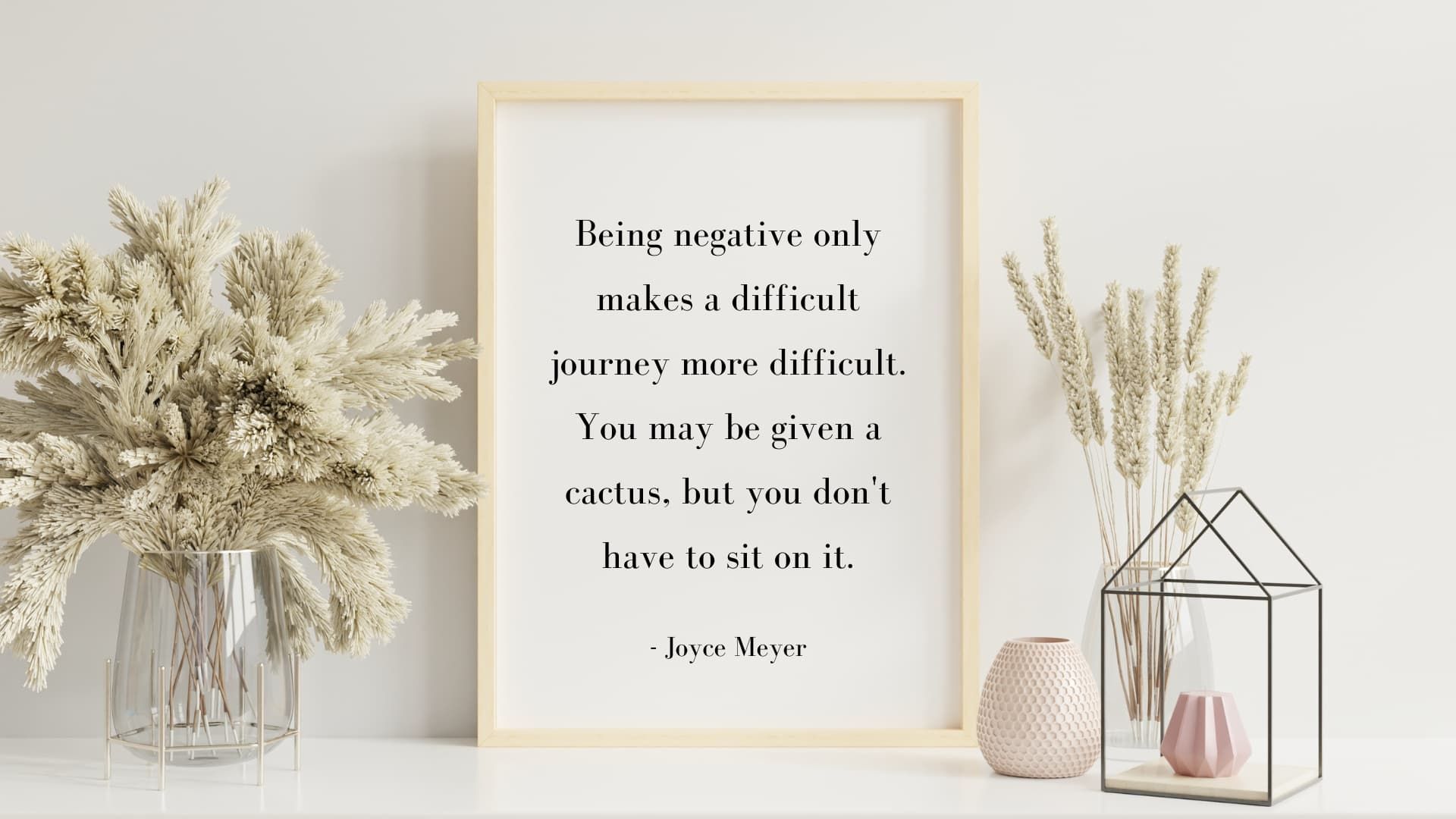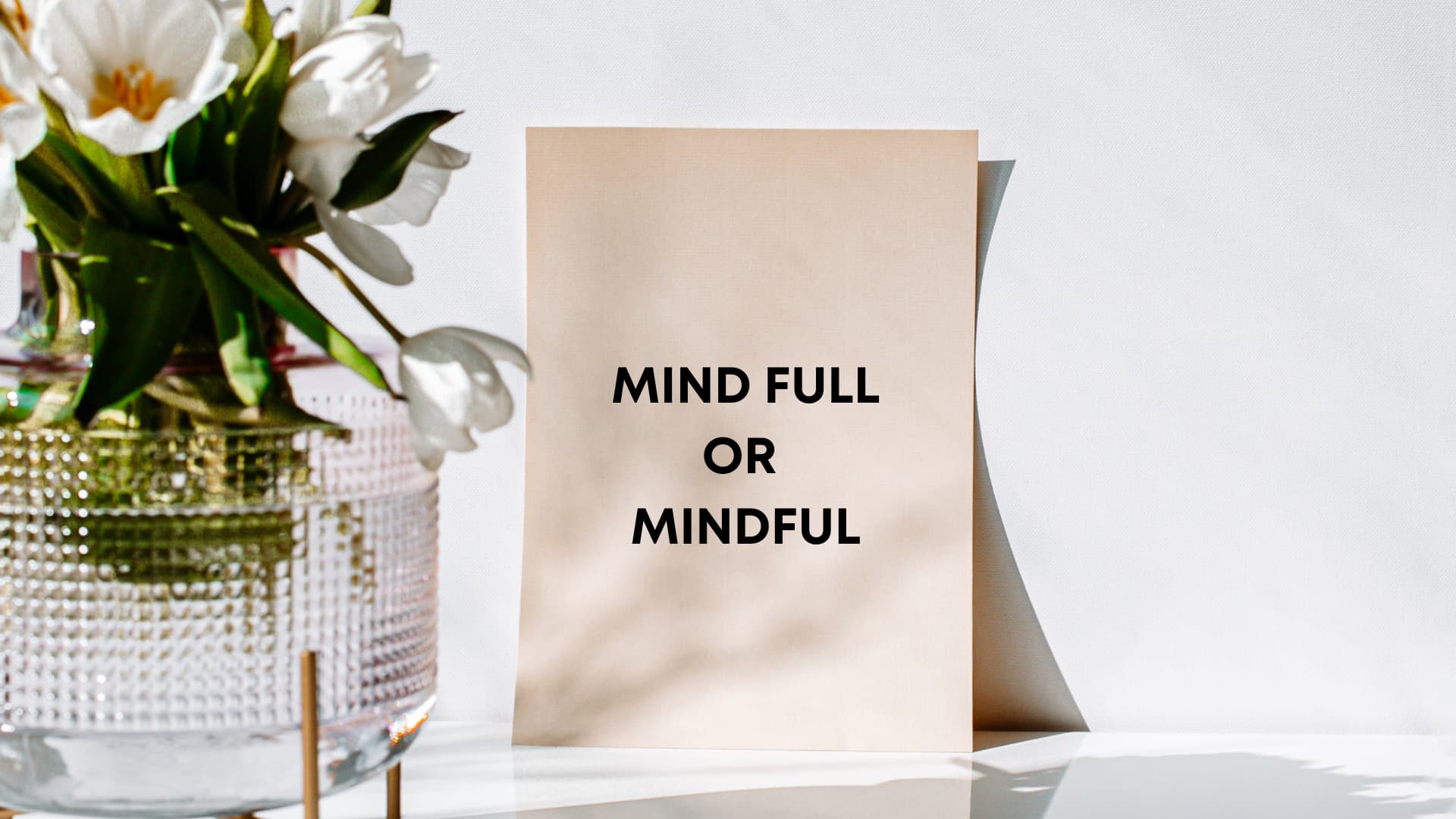4 Strategies for Dealing With Negativity
Jun 07, 2023
Hi there,
Do you know of someone who:
- Always complains about everything, even when things are going well.
- Finds fault with everything and everyone when there is nothing to criticise.
- Belittles or dismisses the achievements of others, seeing them as insignificant or unimportant.
- Is always in a bad mood and frequently lashes out at others for no reason.
- Is extremely critical of themselves and focus on their flaws and shortcomings rather than their strengths and accomplishments.
- Refuses to try new things or take risks because they believe they will inevitably fail or be disappointed.
It's important to note that while everyone can experience negativity from time to time, it becomes a problem when it becomes a pervasive and habitual pattern of thinking and behaviour.
Have you ever felt negative? Did you notice your negativity?
Here's the catch... recognising negative emotions can be difficult as we can become so entrenched in our antagonising feelings or self-defeating thought patterns that we get ourselves stuck in self-serving justifications and make them seem normal that we cannot see any other alternative or take positive actions to move forward.
Additionally, denying the presence of negativity can lead to further distress, mental stagnation, and prevent us from accessing a range of different coping strategies that could help us manage our thoughts and feelings.

Hence, it is essential to recognise when one is feeling negative, or experiencing emotional flooding (I'll explain the concept of 'emotional flooding' in another blog post) in order to better understand why it is happening and take active steps towards regaining emotional equilibrium. Our negativity does tell us a lot about ourselves. But it is never a good idea to allow our negativity to take charge as we may not be in the best head and heart space to make important decisions.
The more aware we are of our internal dialogue and the associated emotions that this brings about, the more equipped we are to seek out effective strategies for managing these feelings and seek out positive solutions.
Definition of negativity and why it can be destructive
Negativity is an emotional state characterised by feelings of pessimism, cynicism, and general unhappiness. It can also refer to negative thought patterns and behaviours that tend to lead to a more pessimistic worldview.
When we experience negativity, we can view the world negatively, focusing on our problems and shortcomings rather than our successes and accomplishments. Having a negative attitude can have a detrimental effect on our mental and physical health, as well as our relationships with others.
Anyone who experiences negativity often feels overwhelmed by their emotions or thoughts, making it difficult for them to make positive decisions or take positive action.
The root causes of negativity can vary, and some common factors include stress, anxiety, depression, trauma, and chronic illness. When we are faced with difficult circumstances or situations that we cannot control, we may feel powerless, which can lead to feelings of negativity.
One of the main problems with negativity is that it can become a self-fulfilling prophecy. When we are in a negative state of mind, we tend to attract negative experiences and outcomes, which in turn reinforce our negative beliefs and perceptions.
We also want to be careful not to get trapped in negativity bias. This is a cognitive phenomenon that describes the tendency for our brains to focus more on negative experiences, thoughts, and emotions rather than on positive ones.

The negativity bias is evident in many aspects of our lives. For example, we tend to remember negative events more vividly than positive ones and negative feedback tends to have a greater impact on us than positive feedback. This bias also affects the way we interpret information, as we tend to give more weight to negative information than positive information.
There are several reasons why we have a negativity bias. One is that negative experiences are more intense and require more attention from our brains. This is because negative experiences can pose a threat to our safety or well-being, and our brains are wired to prioritise these threats. If you're familiar with the flight, fight or freeze responses. Yes, uncomfortable situations that we perceive to be threatening will raise a red flag inside our head, preparing us to get into fight mode as a survival response quickly. Negativity bias is rooted in our evolutionary history and has helped us survive by prioritising potential threats and dangers found in our environment.
Negativity can also have a profound effect on our relationships with others. When we are negative, we tend to be more critical and judgmental of others, which can make it challenging to form meaningful connections and maintain healthy relationships.
Are you feeling subjugated by feelings of negativity, and you spend most of your time:
- Ruminating and focusing on difficult experiences?
- Focusing on what's wrong rather than what's right in life?
- Expecting the worst in any situation?
Here are techniques that could be useful to help you overcome negativity.
Strategies to combat negativity and cultivate a more positive outlook on life:
1. Cognitive-behavioural therapy (CBT)
CBT is a type of therapy that focuses on changing negative thought patterns and behaviours. It is a type of therapy that helps individuals understand the connection between their thoughts, emotions and behaviours, enabling them to break out of these patterns.
One key element of CBT is questioning one's beliefs and assumptions about life; this helps individuals confront any false or unhelpful beliefs about themselves or the world around them. This process allows individuals to develop healthier, more positive thought patterns, which in turn can help improve their mood and outlook on life.
Another element of CBT is learning to recognise distorted thinking patterns such as catastrophising or all-or-nothing thinking. Once an individual learns how to recognise these types of thinking, it becomes easier for them to challenge these thoughts so that they can be replaced with more healthy alternatives.

Here are some ways that CBT can help with negativity:
Step 1: Identifying negative thinking patterns
CBT can help individuals recognise negative thinking patterns, such as black-and-white thinking, overgeneralisation, and catastrophising. By identifying these patterns, individuals can begin to challenge and change them.
Step 2: Challenging negative thoughts
CBT can help individuals challenge negative thoughts by examining the evidence for and against them. This process can help individuals develop a more balanced and practical perspective to achieving positivity.
Step 3: Replacing negative thoughts with positive ones
CBT can help individuals develop more positive thoughts to replace negative ones. This can involve using positive self-talk or reframing negative experiences in a more positive light.
Step 4: Behavioural activation
CBT can help individuals engage in positive behaviours, even when they don't feel like it. This can involve setting goals and taking small steps towards them, which can help individuals feel more positive and motivated.
Research has shown that CBT can be as effective as medication for treating depression and anxiety, and its effects can be longer-lasting. However, it's important to note that CBT is not a quick fix and requires time and effort. To get the most out of CBT, it's best to engage an experienced therapist to achieve the intended outcome.
2. Mindfulness.
Mindfulness involves paying attention to the present moment in a non-judgmental way, which can help us to become more aware of our thoughts and feelings and break the cycle of negativity. It can help individuals become aware of their own negative thought patterns so they can work towards replacing them with healthier ones.

Studies have found that practising mindfulness can reduce stress levels and help individuals focus on the present moment instead of worrying about things that may not happen in the future or dwelling on past events that cannot be changed. Regular mindfulness practice has been shown to result in greater self-awareness and improved emotional regulation, which are both important for reducing overall levels of negativity in an individual's life.
Mindful practices like meditation and yoga are also effective ways through which people can reduce their overall levels of negativity. Research has shown that regular meditation can help improve mental well-being and reduce stress-related illnesses such as depression and anxiety. Similarly, yoga has been linked with improved strength, flexibility, balance and posture, all of which are physical benefits that encourage better body awareness and a more positive attitude towards oneself.
3. Practice gratitude
The practice of gratitude involves focusing our attention on the things in our lives that we are grateful for, which can help to shift our focus away from our problems and onto the positive aspects of our lives. And here are a couple of suggestions on how you can immerse yourself in thankfulness at the end of each day...
-
Keep a gratitude journal
Take a few minutes each day to write down three things that you are thankful for. These can be small things, like having a good meal, or having supportive friends or family members in your life. Writing them down helps to solidify them in your mind and can help you to focus on the positive aspects of your life.
-
Keeping a gratitude jar
Recycle an empty jar and decorate it however you like. Prepare some small pieces of paper and some colour pens. Each day, write down something you are grateful for on a piece of paper and place it in the jar. Over time, you will accumulate a collection of positive memories and things to be grateful for. At the end of the year, you may want to take some time to reflect and give thanks for the beautiful things in your life.
-
Focus on the little simple things
It can be easy to overlook the small things in life and take them for granted. Take a moment to appreciate the little things, like a warm cup of coffee or tea, a good book, or even the ability to breathe normally and our health. By focusing on these small moments of joy, we can cultivate a greater sense of gratitude for the good things in life.

4. Spend time on self-care practices.
Self-care practices are important for everyone but can be especially important for those dealing with negativity and anxiety. By taking care of yourself and prioritising your well-being, you can improve your overall quality of life. Here are some of self-care practices that will benefit you:
-
Get enough sleep
Sleep is essential for good health and well-being. Try to get at least 7-8 hours of sleep each night. If you have trouble sleeping, try establishing a bedtime routine or avoiding caffeine and screens before bedtime.
-
Eat a healthy diet
What you eat can have a big impact on your physical and mental health. Try to eat a balanced diet that includes plenty of fruits, vegetables, whole grains, and lean proteins. Avoid processed foods and sugary drinks.
-
Exercise regularly
Exercise is a great way to improve your physical and mental health. Try to get at least 30 minutes of moderate exercise most days of the week. This could include things like walking, jogging, cycling, or yoga.
-
Spend time in nature.
Spending time outdoors in nature can positively impact your mental and physical health. Try to spend some time outside each day, even if it's just for a short walk around your neighbourhood.
-
Connect with others.
Building strong social connections is essential for good mental health. Make time to connect with friends and family, or join a community group or club. Trust me when I say that having a hearty laugh can greatly benefit you.

While the last few points made on self-care practices may appear obvious or even frivolous, these practices have proven to improve the quality and improve an individual's well-being significantly. Hence, these should not be taken as mere concepts but as our way of life.
Final thoughts
It's important to understand that feeling negative emotions is a natural and normal part of the human experience. No one is happy and positive all the time, and it's okay to feel sad, angry, frustrated, or any other negative emotion. Suppressing or denying negative emotions can actually make things worse in the long run. These emotions are often an indication that something in your life needs attention, and ignoring them can lead to increased bigger mental and physical health issues.
Allowing yourself the time and space to feel and process these emotions is an important part of maintaining your well-being. Avoid judging yourself for feeling negative, denying or blaming others for your negative emotions, as doing so will not help. Learning to recognise the triggers of these emotions and responding in constructive ways can help mitigate the impact. You can actively take action to steer negative emotions into positive ones.
You've got this. Believing that you deserve to live your thriving life is a good start to positive thinking.
With gratitude,

The content, products and services of this website are not meant to substitute any advice provided by mental health and medical professionals. If you suspect that you're facing mental-health-related problems, you're strongly encouraged to seek professional help.




